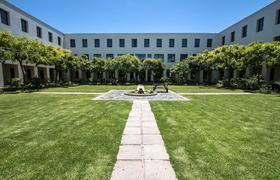UCT GSB MBA leads globally in sustainability and impact
08 November 2025 | Story Supplied. Photo UCT GSB Read time 4 min.
The University of Cape Town Graduate School of Business (UCT GSB) has cemented its position as the leading business school in Africa and among the best in the world. Its Master of Business Administration (MBA) course has once again ranked among the global top 10 in the Better World MBA rankings. The 2025 rankings mark the second year in a row that the UCT GSB’s MBA has ranked 7th in the world for the depth of its engagement with impact, sustainability and the United Nations Sustainable Development Goals.
“At the UCT GSB, our motto is ‘We shape the leaders who shape the future’,” noted Dr Catherine Duggan, the director of the UCT GSB. “There is no question that the future lies in understanding impact, sustainability, leadership and technology. And, most importantly, how these issues intersect in some of the world’s most complex and dynamic environments. We are proud to be consistently at the global cutting edge of management education and excited for the future that our graduates will help shape.”
Now in their 13th year, the Better World MBA rankings, compiled by the Canadian research firm Corporate Knights, are intended to measure “sustainability leadership” among the best MBAs in the world. Ranked programmes are measured on how effectively they integrate sustainability and responsible management into their core teaching, as well as the impact of their graduates working in large sustainable companies and purpose-driven organisations.
“AI [artificial intelligence] and digital technologies are changing how companies measure and manage their impact,” explained Dr Wayne Moodaley, the programme director for the full-time MBA at the UCT GSB and an expert on the use of AI to improve the credibility and reliability of sustainability reporting. “The real opportunity lies in organisations using these tools to make sustainability part of their core strategy – not as a separate initiative, but as a way of improving how they make decisions, manage risk, and create long-term value.”
Importance
The importance of gaining skills and perspectives focused on sustainability has become particularly clear in recent years, as leading global employers report that they see digital access, economic conditions and climate change mitigation as the three most transformative trends for business between now and 2030. Yet, while 63% of global MBA applicants are looking for programmes that incorporate sustainability, not all MBA students have an opportunity to engage with these issues. In the United States, 42% of business schools report that they offer no engagement with sustainability during the MBA, and more than a third of European MBAs do not incorporate sustainability into their core curriculum.
“Sustainability and responsible leadership are woven through every aspect of our MBA at the UCT GSB.”
“Sustainability and responsible leadership are woven through every aspect of our MBA at the UCT GSB,” noted Associate Professor Caitlin Ferreira, the UCT GSB’s programme director for the modular MBA. “From our core courses to the capstone independent study project and our Responsible Citizenship module. We want to create agile, future-oriented leaders who make decisions with an understanding of the broader implications for both business and society.” This approach has garnered global recognition: last month Dr Ferreira was named one of the finalists for the Association of MBAs (AMBA) 2026 MBA Director of the Year award based largely on her work to incorporate sustainability, impact, political economy, innovation and disruptive technology throughout the MBA curriculum.
The UCT GSB’s top showing in the Better World MBA ranking comes after a year of global accolades for the programme and its students. The UCT GSB MBA was ranked #1 in the Middle East and Africa by the 2026 QS Global MBA Rankings, which also named it one of the 100 top MBAs in the world. In the past year, a team of five UCT GSB MBA students won the prestigious Geneva Challenge competition, coming first among 222 teams from 94 countries, and another MBA student attended the Berlin Global Dialogues as one of 25 Young Voices from around the world selected to engage directly with global policy makers.
 This work is licensed under a Creative Commons Attribution-NoDerivatives 4.0 International License.
This work is licensed under a Creative Commons Attribution-NoDerivatives 4.0 International License.
Please view the republishing articles page for more information.










